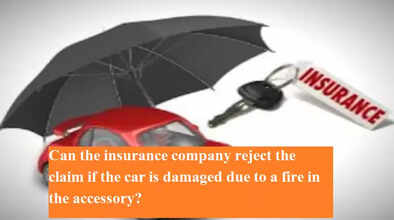Can the insurance company reject the claim if the car is damaged due to a fire in the accessory?

Car Insurance Claim Rejected Due to Accessory Fire: What You Need to Know Before Installing Modifications
Car insurance is meant to protect vehicle owners from financial loss in the event of damage or accidents. However, policyholders are often shocked when their claims get rejected — especially in situations they assume are covered. A recent incident has sparked discussion on whether insurance companies can deny a claim if damage is caused by an accessory-related fire.
The Incident That Raised Questions
Recently, a car owner suffered severe damage to his vehicle after it caught fire. The insurance company, however, rejected the claim. The reason? The fire was allegedly caused by a short circuit in a camera installed in the vehicle — a camera that was not part of the original manufacturer’s fittings.
The insurer cited the forensic report, which stated that the wiring of the aftermarket camera had caused the short circuit. Since this accessory was not installed by the car manufacturer, the damage did not fall under the standard insurance coverage.
What Standard Motor Insurance Covers — and What It Doesn’t
Experts explain that most standard motor insurance policies do not cover losses caused by electrical or mechanical breakdowns. These policies generally provide coverage for damages resulting from accidents, natural disasters, fire due to external causes, theft, and similar incidents.
In the case mentioned, the short circuit was not the result of a manufacturing defect or accident, but rather from a non-manufacturer-installed accessory. This meant the insurer was within its rights to deny the claim under the terms of the standard policy.
Why Manufacturers Warn Against Modifying Electrical Systems
Car manufacturers use high-quality components that undergo rigorous testing to meet safety and performance standards. Every part in a vehicle is carefully designed and installed to prevent hazards.
Modifying the original electrical system — for example, by installing aftermarket cameras, audio systems, or other accessories — can create safety risks and void certain aspects of your insurance coverage. A small wiring fault in such modifications can lead to major incidents like vehicle fires.
How to Protect Yourself — The Role of Add-On Covers
While a standard policy might not cover electrical or mechanical breakdown-related losses, insurance companies offer add-on covers that can expand your protection.
If you want coverage for risks like electrical short circuits, accessory failures, or mechanical damage, you need to purchase specific add-ons when buying or renewing your policy. These add-ons cost extra, but they ensure that if an incident occurs due to electrical issues, your claim will not be automatically rejected.
What to Check Before Installing Accessories
-
Review Your Policy: Before making modifications, check whether your existing insurance covers damages from aftermarket installations.
-
Consider Add-On Protection: If you use accessories like high-end audio systems, cameras, or GPS devices, purchase add-on coverage that explicitly includes them.
-
Ensure Professional Installation: Have accessories installed by authorized service centers to minimize risks.
-
Read Terms & Conditions Carefully: Add-on cover benefits are only applicable if they are clearly stated in your policy document.
Final Word
The takeaway from this case is simple — standard motor insurance does not cover everything. If your vehicle suffers damage due to a non-manufacturer accessory, your claim may be rejected unless you have taken the necessary add-ons.
So, before upgrading your vehicle with new gadgets, think about the risks and make sure your insurance policy is equipped to handle them. A little extra spent on the right add-on cover can save you from a huge financial loss in the future.

